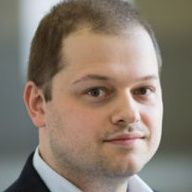
When Dmytro Vovk taught The Rule of Law in Context this spring, Cardozo students heard his firsthand account of how he and his family witnessed the Russian invasion of Ukraine from his home just 30 miles from the Russian border. When the war broke out, he had to quickly decide how to protect his family.
“I spent five days in Kharkiv and then realized it wasn’t safe and sent my family away to the E.U.,” he said.
Vovk, a visiting law professor at Cardozo, teaches law at Yaroslav Mudryi National Law University in Ukraine, where he runs the Center for the Rule of Law and Religion Studies. He also teaches at Ukrainian Catholic University in his home country.
Following the Russian invasion of Ukraine, Vovk relocated to the United States temporarily with support from Yeshiva University, Cardozo School of Law and Etta Brandman, a trustee of the Vivian G. Prins Foundation.
As a scholar who specializes in the rule of law and human rights, Vovk was shocked by the invasion. Until about a week before the war began, he thought it would never happen.
“It makes no sense,” he said. “The whole justification of the war offered by [Russian President Vladimir] Putin is nonsense.”
He said that unlike many other conflicts, the Russia-Ukraine War has no real security, geopolitical or economic issues behind it. Rather, it is Putin’s own “ridiculous philosophy, and Russian society’s support or at least acceptance of the war for some imperialist phantoms.”
Vovk’s legal area of expertise is law and religion, which put him in contact with scholars and other professionals in the United States throughout his career who approached him about teaching here.
Through his scholarly contacts, he met Rabbi Dr. Stuart Halpern, senior advisor to the Yeshiva University provost and senior program officer of the Straus Center for Torah and Western Thought. One of Halpern’s scholarly goals is to continuously advance the idea that Jewish texts and values can inform the global moral conversation. Support for Vovk was a natural outgrowth of that work.
Speaking at an event at YU in the spring, Vovk said that Russia’s invasion has had profound implications for the expression of religious freedom.
“Russia and its bloody attack against Ukraine have turned one of the most religiously pluralistic Ukrainian regions (Donbas and Crimea) into the territory of the grossest violations of religious freedom in Europe,” he said. “Several religious groups, which had been flourishing before 2014, disappeared or left the region, and they presumably will never come back, even when the war is over.”
Vovk is working on a book, The Church of the Enemy, which examines how the state can regulate religions that are or are potentially disloyal during times of war from a human rights perspective. He studies how war affects state politics and how countries in conflict can operate in a way that complies with international human rights laws, which he said are completely violated by the Russians.
Since coming to Cardozo, he has met with many colleagues, including University Professor Michel Rosenfeld, a renowned scholar in comparative constitutional law who has written and lectured extensively on the subject.
Vovk has seen the dissolution of support for Russia in Ukraine up close.
“The Russian soldiers really thought they would be welcomed,” he said. “They were stunned.”
Vovk said that while Russian media had fed lies to Russian citizens about the war, there was also a massive failure of Russian intelligence in understanding how average Ukrainians would respond to their country’s being invaded. Until 2014, when Russians annexed Crimea, he said that Putin was quite popular, especially in eastern and southern parts of Ukraine, and could have held influence over the population.
“Any support for Russia or its politics is gone now,” Vovk said. “No matter the outcome of this war, there will be no acceptance of Russian culture, church, language or media–none of the soft-power things necessary for Putin if there is a plan to eventually control the country.”
Although it has been difficult, Vovk and his family are acclimating to life in America. This fall, Vovk will teach a class on religious freedom and gender equality.
His older daughter has settled into school in Manhattan with the help of friends and colleagues at YU.
“She really enjoys it so much, more than she did in Ukraine,” he said.
Vovk hopes to eventually return to his homeland.
“The plan is to go back home, of course,” he said. “But it must be safe for my kids.”
Vovk said his family is in a better situation than most people in eastern Ukraine and pointed to the millions suffering there.
“I appreciate the support of the law school and the university community very much,” he said. “Their response and the support for Ukraine in the West has been critical to helping defend our country in the face of the catastrophe that is happening there.”
